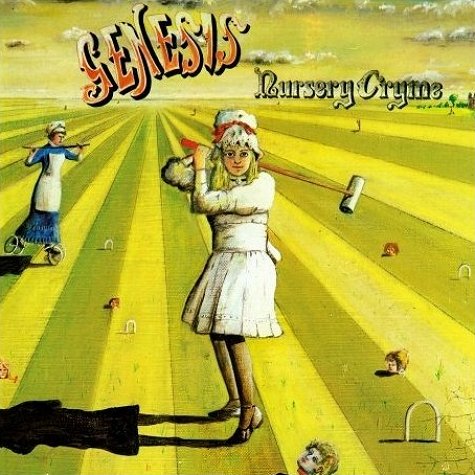
Nursery Cryme (1971)

1.The Musical Box
2.For Absent Friends
3.The Return of the Giant Hogweed
4.Seven Stones
5.Harold the Barrel
6.Harlequin
7.The Fountain of Salmacis
With their third album, Genesis finally now has a solid lineup of strong musicians. After the ambitious, but somewhat lackluster Trespass, guitarist Ant Phillips called it quits. Apparently the heavy schedule demands were simply too much for his health. It was a bit ironic since, back then, Phillips was considered the best musician in the group. Steve Hackett was found via an advertisement and proved to be an even stronger replacement, so all was good there.
In the drumming department, the decision was actually made to sack current drummer John Mayhew since he just wasn’t working out. Enter Phil Collins. Now, back in 1971, Phil Collins was still a very long way from becoming a household name. His strengths, however, are immediately apparent. Although the earlier albums, including this one, still had the drums too buried within the mix, close listening reveals that he is, in fact, much better at his job than anyone else that had been in the group. His strengths are definitely illuminated. As a side bonus, this new drummer could also sing. Other than Peter Gabriel, none of the other band members could even handle background vocals very well. Collins would be primarily a backing singer until Gabriel departed in 1975, but he has the perfect voice to blend with Gabriel’s. In many aspects, they sound quite similar. Collins, at least in these early days, had a much softer touch, and really couldn’t quite muster being a lead singer at this point. Confidence and training would prove otherwise later in the band’s history.
With all of the key musicians in place, it would be wonderful if one could say that they finally have produced a masterpiece, but they haven’t quite arrived. In many ways, they’ve taken a step backwards since the band is sporting a 40% turnover. The musicianship is definitely better, but many of the songs sound too juvenile and underwhelming.
The good news is this record has many strengths. The biggest is the opening number The Musical Box. This is one of those “early Genesis prog-rock epics that runs over ten minutes”. Such a distinction doesn’t necessarily make it pleasurable, but they succeed in a big way with this song. The cut starts off slow and easy, with Hackett and Mike Rutherford weaving their 12-string guitars back and forth over Gabriel’s soft, but powerful vocals. As the track progresses, it gets heavier, louder and busier and ends up with a great crescendo that even these days is immediately recognized by most. The band played the “closing section” of this song as late as 1992 to the great delight of fans.
Immediately following this epic is the much shorter For Absent Friends. This song has mostly been forgotten since it barely clocks in at 100 seconds. Why was this song so short? It’s actually quite beautiful. From what I’ve heard, this song is mostly the “new guys”. Hackett apparently wrote the bulk of the track, and Collins actually sings the lead. Had this thing been fleshed out into a “real” song (i.e. at least 3 minutes or so), it could have been destined as an early classic. As it is now, one finally gets into the groove of this beautiful piece before it abruptly ends. Again, the guys were still learning.
Speaking of “still learning”, I admit that the rest of the album really doesn’t do that much for me. The Return of the Giant Hogweed and Fountain of Salmacis have some good points, but both songs are weighted down a bit too much by the members trying to sound weird and cool at the same time. The former song sounds a bit too rough for early Genesis. It sounds like their trying to “rock out” or something. The latter piece is a much better effort musically, but its heavy mythological lyrics tend to force one to admit that the song hasn’t aged too well.
There are three other songs on this record, yet none of them are the slightest bit memorable. So, they’ve gone a bit backwards from Trespass as far as the overall song craft goes, but they’ve grown by leaps in terms of musicianship and quality. Still, though, this is definitely “early” Genesis, and my guess is that 95% of the fans that didn’t discover this band until the mid-1980s won’t necessarily be blown away by a lot of what is here.
Go back to the main page
Go To Next Review